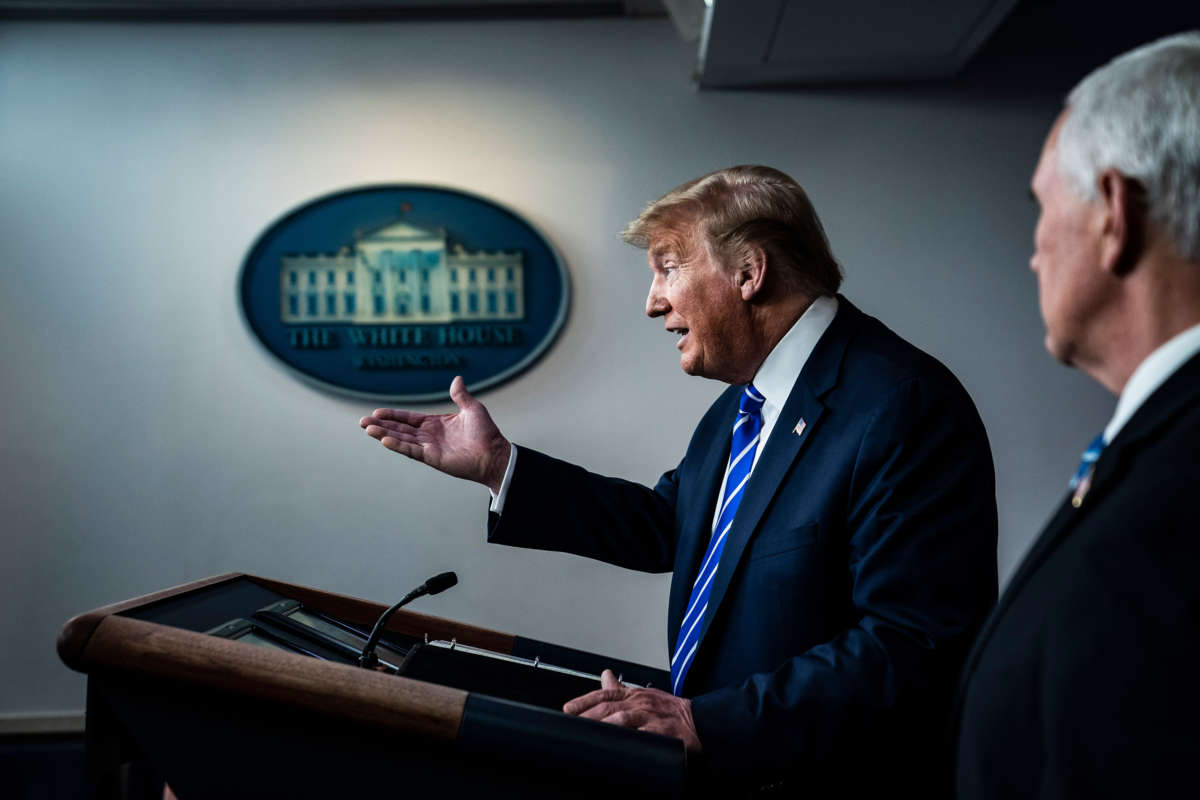President Donald Trump on Thursday made alarming comments about the possibility of using disinfectants in order to treat the coronavirus that were immediately dismissed by both medical professionals and the companies that create such products.
During a White House press briefing, William N. Bryan, head of the Department of Homeland Security’s science and technology division, said that he had seen evidence that the disease doesn’t live as long in tropical climates and humid temperatures.
“The virus dies quickest in sunlight,” Bryan explained.
That led to Trump making speculations of his own, suggesting that it might be possible to bring light “inside the body, which you can do either through the skin or some other way” in order to treat coronavirus.
The president then discussed the possibility of his science team looking into disinfectants as well, and whether injecting such chemicals into the human body would be beneficial.
“I see the disinfectant that knocks it out in a minute, one minute,” Trump said. “And is there a way we can do something like that by injection inside or almost a cleaning? As you see, it gets in the lungs, it does a tremendous number on the lungs, so it would be interesting to check that.”
Later, Lysol and Dettol maker Reckitt Benckiser released a statement regarding proper use of their products and discouraged the ideas proposed by the president.
“As with all products, our disinfectant and hygiene products should only be used as intended and in line with usage guidelines,” the statement from Reckitt said. The company added that “under no circumstances” should their products be ingested or injected, or otherwise administered to the human body in an improper way.
A number of disinfectants are toxic when ingested or injected into the human body. Drinking bleach, for example, which a number of people have already done errantly believing it can help cure the coronavirus, can result in a number of distressing outcomes, including burns in the esophagus and stomach, vomiting and shock within a few hours. Depending on how much is consumed, a person can even die from drinking it.
Medical experts, including CNN’s Sanjay Gupta, dismissed Trump’s claims that an investigation into whether disinfectants might work against the disease might need to be studied.
“Actually it doesn’t,” Gupta said. “I mean, we know the answer to this one. There’s a lot of things out there that we don’t know the answers to and we need to investigate.”
The comments from Trump provide further proof for why most people in the U.S. might not trust the president when it comes to matters relating to the coronavirus pandemic. Indeed, data from an Associated Press/NORC Center for Public Affairs Research poll released earlier this week found that the majority of Americans don’t put much faith in what he has to say about the crisis at all.
Only 23 percent of Americans have “a great deal” or “quite a bit” of trust in Trump’s words on the virus, while 21 percent said they have a “moderate amount” of trust in him, according to the poll. Meanwhile, 54 percent said they only trust Trump a “little” or “not at all” when it comes to COVID-19 matters.
Trump’s comments on scientific topics have been dubious, to say the least, oftentimes at odds with what researchers have said on a number of topics. One organization even detailed how the president has “attacked” science in hundreds of ways since taking office, censoring or outright ignoring findings on a number of important issues impacting the nation.
His comments regarding coronavirus have been demonstrably misinformative, too. Trump has frequently compared the virus to the flu, even though COVID-19 has been found to be much deadlier than influenza. He has also peddled the drug hydroxychloroquine as a potential treatment for coronavirus, despite lacking scientific evidence demonstrating as much, and has dismissed studies that have suggested that medication might be dangerous for use against the disease.
Join us in defending the truth before it’s too late
The future of independent journalism is uncertain, and the consequences of losing it are too grave to ignore. To ensure Truthout remains safe, strong, and free, we need to raise $46,000 in the next 7 days. Every dollar raised goes directly toward the costs of producing news you can trust.
Please give what you can — because by supporting us with a tax-deductible donation, you’re not just preserving a source of news, you’re helping to safeguard what’s left of our democracy.
